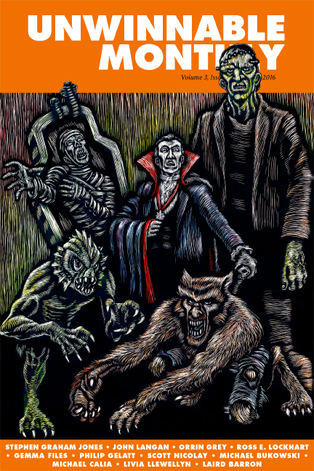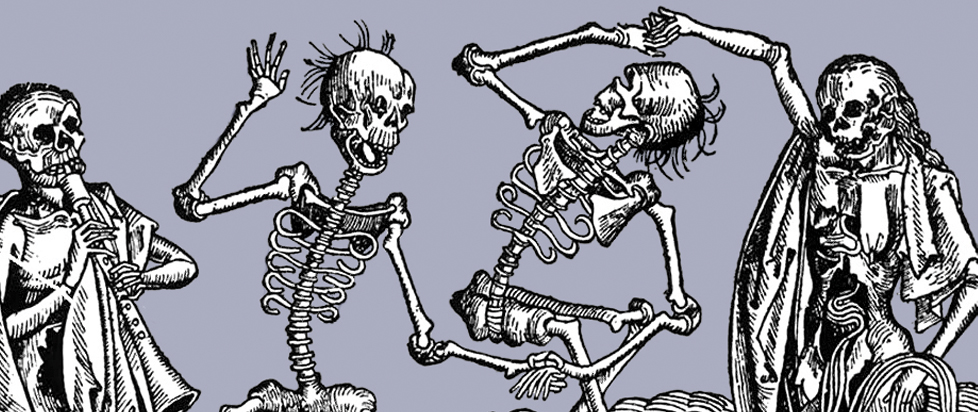
The Fear in a Handful of Dust
 This column is a reprint from Unwinnable Monthly #84, the Monsters issue. If you like what you see, grab the magazine for less than ten dollars, or subscribe and get all future magazines for half price.
This column is a reprint from Unwinnable Monthly #84, the Monsters issue. If you like what you see, grab the magazine for less than ten dollars, or subscribe and get all future magazines for half price.
———
Gavin Craig has a lot of games on his shelf that he’s never played. Backlog is his attempt to correct that.
———
You wake up in the woods.
There is something not quite right about you. Your eyes are glowing pinpoints but your features, if you have any, are shrouded in darkness. You have the size and proportions of a child but your movements have the jerky, imprecise quality of an inanimate object directed by invisible strings. The world flickers as you look at it.
You are alone.
* * *
I first played Limbo a couple of years ago, but this year I came back to finish it. Limbo developer Playdead has a new game out, Inside, which is built on a lot of the same architecture as Limbo. You direct a boy who may or may not be entirely alive who runs from left to right through a world determined to tear your body (alive or not) to pieces.
Inside and Limbo are both fables, but Limbo is a bit more of a fairy tale. It is a world of dangers that exist beyond the possibility of explanation. Every pit is a tiger trap, every pond a grave. Bear traps close around the boy’s neck and, as his severed head falls away, a single gush of inky blood spurts from his neck. Limbo’s gore is understated, if such a thing is possible. It’s not quite right to say that it revels in dismemberment, so much as to treat it as unremarkable to the point of being unworthy of comment.
* * *
You emerge from the darkness of a cave.
There is a small boat waiting for you. You climb in and cross a featureless sea, driven forward by an invisible wind that pushes against a mast with no sail. Monsters await you. Spiders who impale you with their pointed legs. Boys waiting to do far worse, who leave hanging rag dolls to show where they have been.
* * *
My fears are mundane things. I grew out of ghosts and monsters long ago. When I awaken in the middle of the night, it is in terror of the fragility of my own body and those of my children. I am afraid of wind, water and indifference. The cosmos does not care what happens to me. I do not require forces beyond humanity and nature to account for the inevitability of my annihilation.
For all that, or perhaps because of all that, Limbo exists as an act of love. The boy will die. The boy may in fact already be dead, but Limbo works as much to save him as to rip him asunder. For every pit, saw blade, bullet and monster there is a way to escape. Even when Limbo seizes control of the boy’s body, glowing parasites pushing him on regardless of the dangers around him, hope is never completely lost. Limbo is a world of danger, but it is also a path. There may not be a way out, but there is without doubt a way through.
* * *
You are in the world, and of the world.
Children lay traps for you, and when they fail you push their bodies into the river and step across them to the other side. When a spider chases you and falls, you pull off its legs and roll its body into a tiger pit. It is all a game, simple and severe. Jack and Piggy without the garish insistence on names. Everyone is Piggy. Everyone is Jack.
* * *
Limbo is a game remarkable for its elisions and absences. There is no musical flourish when the boy dies. There is no explicit transition between the game’s four thematic areas — the forest, the tree forts, the city and the factory. There is no space for innocence.
Limbo is a child’s game and not a child’s game in the way that we can neither remain children nor entirely escape our childish selves. It is cruelty and resilience, a game and the way that our games are never really just games. It is a black-and-white film shown on a flickering projector through a high-definition screen. It is just a few hours long. It took me three years to play.
* * *
You open your eyes in the grass again.
You have pulled levers and the world has twisted around you. You have fallen in strange directions. Your eyes have closed and open again. There is a girl there, but you are not there to save her. It isn’t clear you have managed to save yourself.




